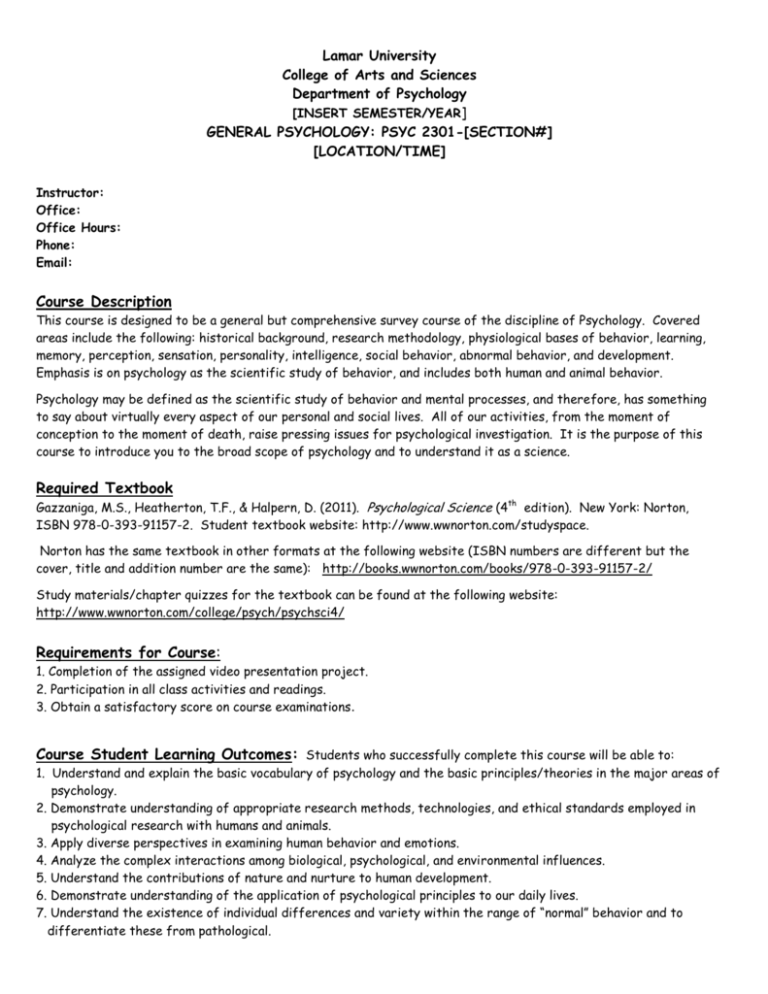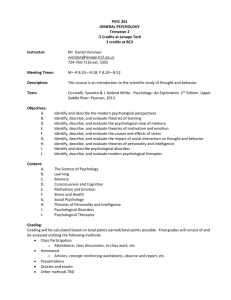Psychology 2301 - Section 5
advertisement

Lamar University College of Arts and Sciences Department of Psychology [INSERT SEMESTER/YEAR] GENERAL PSYCHOLOGY: PSYC 2301-[SECTION#] [LOCATION/TIME] Instructor: Office: Office Hours: Phone: Email: Course Description This course is designed to be a general but comprehensive survey course of the discipline of Psychology. Covered areas include the following: historical background, research methodology, physiological bases of behavior, learning, memory, perception, sensation, personality, intelligence, social behavior, abnormal behavior, and development. Emphasis is on psychology as the scientific study of behavior, and includes both human and animal behavior. Psychology may be defined as the scientific study of behavior and mental processes, and therefore, has something to say about virtually every aspect of our personal and social lives. All of our activities, from the moment of conception to the moment of death, raise pressing issues for psychological investigation. It is the purpose of this course to introduce you to the broad scope of psychology and to understand it as a science. Required Textbook Gazzaniga, M.S., Heatherton, T.F., & Halpern, D. (2011). Psychological Science (4th edition). New York: Norton, ISBN 978-0-393-91157-2. Student textbook website: http://www.wwnorton.com/studyspace. Norton has the same textbook in other formats at the following website (ISBN numbers are different but the cover, title and addition number are the same): http://books.wwnorton.com/books/978-0-393-91157-2/ Study materials/chapter quizzes for the textbook can be found at the following website: http://www.wwnorton.com/college/psych/psychsci4/ Requirements for Course: 1. Completion of the assigned video presentation project. 2. Participation in all class activities and readings. 3. Obtain a satisfactory score on course examinations. Course Student Learning Outcomes: Students who successfully complete this course will be able to: 1. Understand and explain the basic vocabulary of psychology and the basic principles/theories in the major areas of psychology. 2. Demonstrate understanding of appropriate research methods, technologies, and ethical standards employed in psychological research with humans and animals. 3. Apply diverse perspectives in examining human behavior and emotions. 4. Analyze the complex interactions among biological, psychological, and environmental influences. 5. Understand the contributions of nature and nurture to human development. 6. Demonstrate understanding of the application of psychological principles to our daily lives. 7. Understand the existence of individual differences and variety within the range of “normal” behavior and to differentiate these from pathological. Student Learning Outcomes for the Behavioral & Social Science Core Component Area Critical Thinking Skills: Students who successfully complete this course will demonstrate critical thinking by applying psychological principles and the logic underlying the empirical and scientific methods used in the field of psychology to their daily lives. Methods of teaching critical thinking skills include: lecture, group and classroom discussions, required textbook readings designed to emphasize critical thinking about the course content, and supplemental reading assignments. Student's will also complete a video presentation project in which they critique the validity and empirical support provided for claims made in media advertisements. Communication Skills: Students who successfully complete this course will demonstrate effective oral and visual communication skills through the creation of an original audio-video presentation in which they develop, interpret, and clearly express their critiques of advertisement media claims. Methods of teaching oral and visual communication skills include: lecture, group discussions, supplemental reading materials addressing oral communication techniques, and practice presentations that will allow students to receive feedback from and provide feedback to fellow classmates. Empirical and Quantitative Skills: Student who successfully complete this course will demonstrate empirical and quantitative skill by accurately formulating central conclusions from quantitative data and appropriately creating/interpreting graphic representations of numerical data. Methods of teaching empirical and quantitative reasoning include: lectures which address research techniques and strategies; group discussions and exercises requiring students to reach logical conclusions based on empirical data and basic descriptive statistics; required textbook readings emphasizing empirical and quantitative reasoning; and the completion of a video presentation project in which students critique the scientific merit of claims made in advertisement media, present a research proposal for assessing the product claims, and provide numerical and graphical representations of data that would be consistent with the claims. Social Responsibility (cultural): Students who successfully complete this course will demonstrate an accurate understanding of the impact of culture upon the complex interactions among biological, psychological, and environmental influences within the domains of psychology. Teaching methods include: class discussions, lecture, and required textbook readings that evaluate the role of culture within every foundational area of psychology. Course Structure and Teaching Methodology: Teaching methodology will include lecture, group discussions, video presentations, and classroom activities. The course will be taught in such a way that students will be encouraged to ask questions, participate in discussion, and gather information in a supportive atmosphere. Disability Accommodation: It is the policy of Lamar University to accommodate students with disabilities, pursuant to federal and state law, and the University’s commitment to equal educational opportunities. It is a student’s responsibility to register with Lamar’s Disability Support Services (Communication Building Room 105, 8808347) as quickly as possible. Students who feel they may need an accommodation based on the impact of a disability should contact the professor directly during the first week of the course. University Holidays: insert appropriate dates here Course Policies Attendance Policy: Regular attendance is expected of all students. Students who are absent more than 50% of the time will incur a decrease by one letter grade to their final grade for the course. Each student is accountable for all work missed because of absence. Instructors are under no obligation to make special arrangements for students who have been absent. Should an absence be unavoidable, the student is encouraged to obtain assignments and lecture notes from a classmate. Attendance data will be reported to the Financial Aid Department in accordance with state and federal laws. A student who will miss class due to a university sponsored event has the responsibility to inform the instructor of an upcoming absence prior to each event occurrence. If you fail to do so, you will be considered absent from class. Expectations of classroom behavior: Students are full partners in fostering a classroom environment that is conducive to learning. In order to assure that all students have the opportunity to gain from time spent in class, students are prohibited from engaging in any form of behavior that detracts from the learning experience of fellow students. Inappropriate behavior in the classroom may result in a request for the offending student to leave class. Academic Integrity: As stated in the Lamar University Student Handbook, “Any student found guilty of dishonesty in any phase of academic work will be subject to disciplinary action. Punishable offenses include, but are not limited to, cheating on an examination or academic work which is to be submitted, plagiarism, collusion, and the abuse of resource materials” (p. 81). Any student found guilty of academic dishonesty will be awarded a reasonable penalty that may include a failing grade in the course. Students who wish to appeal the decision may do so as specified in the Lamar University Student Handbook (available at www.lamar.edu). All projects must reflect original work by the students in this course. Materials for projects must be used only for this course. Accidental plagiarism may be avoided by consulting web pages such as those that follow. http://owl.english.purdue.edu/handouts/research/r_plagiar.html http://www.indiana.edu/~wts/pamphlets/plagiarism.shtml http://www.hamilton.edu/writing/style/plagiarism/plagiarism.html The Lamar University web links providing information on expected conduct and academic dishonesty are provided. Please review these materials so you are aware of your rights and the expectations placed upon you: http://students.lamar.edu/student-handbook.html http://students.lamar.edu/academic-support/academic-policies.html Drop/Withdrawal: Students are responsible for making sure they are properly enrolled in the course. If, at any time, students decide not to participate in the course, it is their responsibility to officially drop or withdraw according to university policy. Drops or withdrawals after the course begins may carry financial penalties. Departmental Requirements for Research Participation: The psychology department requires students taking this course to complete 3 experiments or research reading reports. You may do any combination of experiments and reading reports as long as the total number of requirements are met. You may earn these credits by participating in current research being conducted by faculty and students in the psychology department and/or by evaluating and summarizing research articles obtained from an A.P.A. research journal. Instructions for completing research credits and reading reports are posted on the course Blackboard site. Please note the deadline for the completion of research credits and reading reports. Reading reports and experimental credits are due by INSERT DATE. Please note: failure to complete all research participation credits by the appropriate deadlines will result in a grade of “I” until the credits are completed. Evaluation Methods and Assignment of Grades: Course grades will be based on three unit exams, a comprehensive final exam, and an audiovisual presentation project. Exams will be based on assigned reading, lectures, videos, and classroom activities. Questions are designed to test students’ knowledge of material and ability to apply this knowledge. A student has the option to drop the lowest of the 4 exams grades, with the exception of an exam score of ‘0’ resulting from academic dishonesty, which may not be dropped as the lowest test grade. Students who miss an exam will receive a score of ‘0’ and this will be the grade dropped. The final exam will be comprehensive and given during the scheduled final exam period for this class. Unit exams and final exam count equally toward the final course grade. Optional extra credit assignments or quizzes may be offered, and you must be present during the entire class to participate and receive credit. There will be no ‘make-ups’ for extra credit activities missed due to absence from class. Group Video Project: Every student will participate in a group video project. In this project, each group will create and submit a video in which they evaluate the claims made in an advertisement, design an experimental study to test the advertiser’s claims, and apply psychological principles (described in specified textbook chapters) to propose possible explanations of why a consumer would choose to buy the product. GRADING SCALE A = 90% or higher B = 80% - 89.99% C = 70% - 70.99% D = 60% - 60.99% F = Below 60% Course Outline: You will be responsible for reading the text chapters assigned to each topic. Readings should be completed by the assigned date. UNIT 1 Chapter 1: The Science of Psychology Chapter 2: Research Methodology Chapter 3: Biology and Behavior Chapter 4: Sensation & Perception UNIT EXAM #1 UNIT 2 Chapter 5: Consciousness Chapter 6: Learning Chapter 7: Attention and Memory Chapter 8: Intelligence (only pages 344-363) Chapter 9: Human Development UNIT EXAM #2 UNIT 3 Chapter 11: Health & Well-Being Chapter 12: Social Psychology Chapter 13: Personality Chapter 14: Psychological Disorders UNIT EXAM #3 COMPREHENSIVE FINAL EXAM Please note: University policy requires that the final exam for a course be given during the officially-scheduled exam period. Administration of a final exam at any other time is strictly prohibited. * Any necessary changes in course plan, exam dates, or reading assignments will be announced in class.




